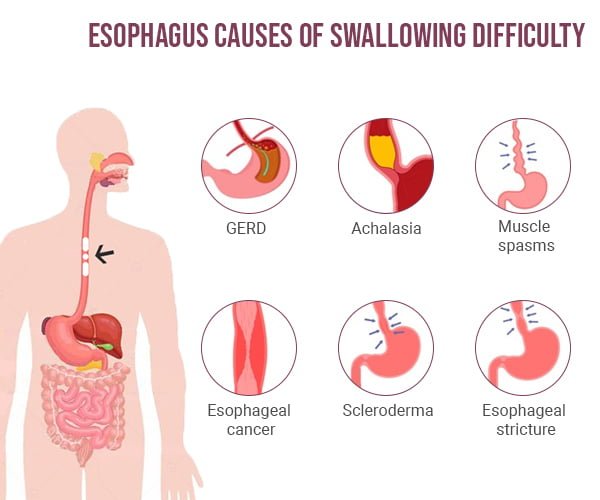If you have difficulty swallowing food or liquids, you may have a medical condition called dysphagia. If you are experiencing dysphagia, you should always be evaluated with a thorough consultation and examination by a physician for an accurate diagnosis and treatment plan to exclude a serious illness or condition such as esophageal cancer or other causes. There are many potential causes of dysphagia that will require a thorough evaluation.
”
★ ★ ★ ★ ★I was able to be seen by Dr. Yakubov the same day. The office was clean and upscale, and I was seen by the medical assistant within a few minutes of arriving. Dr. Yakubov was very easy to talk to and explained all of his thoughts and everything we went through during the appointment. I got what I needed from this appointment, and I felt very comfortable. The appointment duration was also very appropriate.
Symptoms of Difficulty Swallowing
If an obstruction is blocking your windpipe or preventing you from breathing properly, get medical help immediately. Symptoms of swallowing difficulty can include:
- Coughing or choking when trying to swallow
- Pain while swallowing
- Unable to swallow
- Drooling
- Hoarseness
- Feeling like food is stuck in your throat or chest
- Regurgitation
- Heartburn / GERD
- Acid reflux
- Dehydration
- Unexpected weight loss
Causes of Difficulty Swallowing
When you swallow, it seems like a natural act, but it’s composed of three actions: moving food or liquid from your mouth to your throat, squeezing it down your throat past your windpipe, and sending it down your esophagus to your stomach. Problems can occur during any of the three actions.
Mouth causes of swallowing difficulty include:
- Dry mouth, not enough saliva to move food out of your mouth, which medications or a different health issue can cause.
Throat causes of swallowing difficulty (oropharyngeal dysphagia) include:
- Neurological disorders such as Parkinson’s disease, Alzheimer’s disease, Lou Gehrig’s disease, multiple sclerosis, cerebral palsy, muscular dystrophy, or post-polio syndrome
- Neurological damage such as from a spinal cord injury or stroke
- Cancer and some cancer treatments
- A condition called pharyngeal diverticula creates a small pouch in your throat, just above your esophagus, that collects food and leads to difficulty swallowing and other problems
Esophagus causes of swallowing difficulty (esophageal dysphagia) include:

- Esophageal muscle weakness (a condition known as achalasia) or other motility disorders
- Esophageal stricture, a narrowing of your esophagus
- Eosinophilic Esophagitis
- Esophageal Cancer
- Food allergies
- Food-created blockages
- Involuntary muscle spasms or other motility disorders
- Lymph nodes or bone spurs pressing on your esophagus
- Scar tissue caused by gastroesophageal reflux disease
- Scleroderma, when your esophagus hardens and narrows
Diagnosing Difficulty Swallowing

Treating Difficulty Swallowing
The treatment of your symptoms will depend on the underlying cause and the diagnosis. As discussed above, there are many possible causes of your symptoms. Your gastroenterologist will be able to prescribe an individualized treatment after establishing a diagnosis.
Important Reminder: The only intent of this information is to provide guidance, not definitive medical advice. Please consult a doctor about your specific condition. Only trained, experienced gastroenterologists like our doctors can determine an accurate diagnosis and proper treatment.
As best-in-class NYC gastroenterologists, our doctors provide highly personalized and comprehensive care. For more information about your difficulty swallowing concerns or to schedule an appointment with one of our GI doctors, please contact our Union Square/Chelsea, Midtown, or Upper East Side NYC offices.

